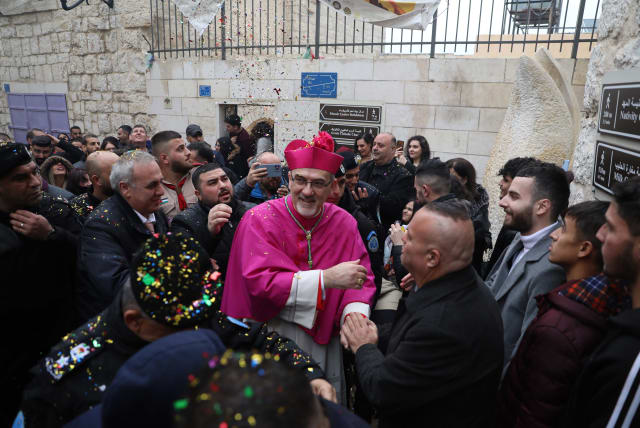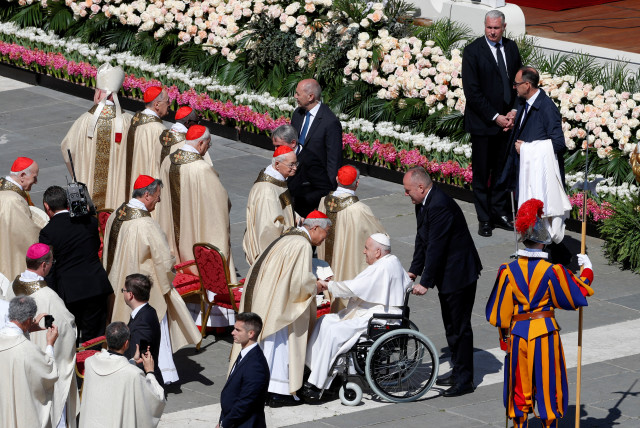Latin Patriarch of Jerusalem to be made cardinal in September

The new cardinals will come from countries including the United States, Italy, the pope's native Argentina, Hong Kong, and several others.
Pope Francis announced on Sunday that he would elevate 21 churchmen to the high rank of cardinal, again putting his mark on the group that will one day choose his successor after his death or resignation.
The ceremony to install them, known as a consistory, will be held on September 30 this year, the 86-year-old Francis announced during his noon prayer to pilgrims and tourists in St. Peter's Square, Rome.
The new cardinals will come from countries including the United States, Italy, the pope's native Argentina, Hong Kong, and several others.
After the appointment, there will be 137 cardinal electors, about 73 percent of them chosen by Francis. This increases the possibility that the next pope will share his vision of a more progressive, inclusive Church. Cardinal electors are cardinals under the age of 80 who have permission to vote for the next pope.
Francis has also increased the possibility that the next pope will come from Asia or Africa, having consistently named cardinal electors from those continents and giving less importance than his predecessor to countries in Europe.
Latin Patriarch to become cardinal
Among the candidates is Patriarch Pierbattista Pizzaballa, Latin Patriarch of Jerusalem. The patriarch has served in the role since 2020 when he was appointed by Pope Francis. Pizzaballa previously served as Apostolic Administrator of the Latin Patriarchate of Jerusalem.
The Patriarchate of Jerusalem is one of the five original churches founded by the Apostles, the other four are Alexandria, Antioch, Constantinople, and Rome. These five churches are considered more important due to their history and apostolic succession. Although within the Catholic hierarchy, they are no more important than any other bishop.
There are currently three churches that claim the title of Patriarch of Jerusalem. Pizzaballa represents the Roman Catholic claim, while there are also Greek Orthodox and Armenian claimants as well, both appointing their own Patriarchs without reference to Rome.
Pizzaballa's appointment made him the first Italian to take up the role since 1987 when Michel Sabbah was appointed as the first Palestinian to hold the role for over 500 years.
The Jerusalem Latin Patriarchate holds authority over the Catholic churches in Cyprus, Jordan, Israel, and Palestinian territories, and its purpose is to help coordinate the churches in providing both pastoral and spiritual care for Catholics in those countries.
The modern Jerusalem Latin Patriarchate was refounded in 1847 after the opening of the Middle East to Western powers following Napoleon's invasion of Egypt. The Latin Patriarchate had previously existed several times with the first distinct Latin Patriarchate being founded during the Crusades. Although the Jerusalem Latin Patriarchate claims to have originally been founded by the Apostle James, brother of Jesus, it emerged after the Great Schism when four of the original five church patriarchates, including Jerusalem, sided with the Byzantine Empire over the Pope.
Traditionally the Latin Patriarchs of Jerusalem have commonly developed ties more exclusively with Palestinians than Israel, due to their congregation being composed mostly of Palestinian Catholics. The current patriarch, Pizzaballa, speaks Hebrew and has tried to develop a relationship with Jewish leaders both secular and spiritual.
Jerusalem Post Store
`; document.getElementById("linkPremium").innerHTML = cont; var divWithLink = document.getElementById("premium-link"); if (divWithLink !== null && divWithLink !== 'undefined') { divWithLink.style.border = "solid 1px #cb0f3e"; divWithLink.style.textAlign = "center"; divWithLink.style.marginBottom = "15px"; divWithLink.style.marginTop = "15px"; divWithLink.style.width = "100%"; divWithLink.style.backgroundColor = "#122952"; divWithLink.style.color = "#ffffff"; divWithLink.style.lineHeight = "1.5"; } } (function (v, i) { });

